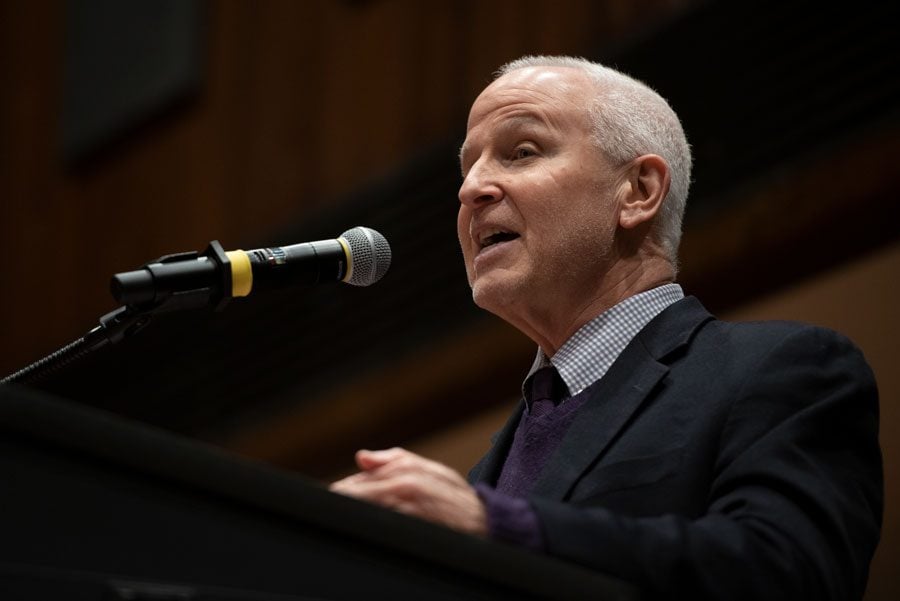Schapiro addresses Jeff Sessions protest, praises University response at Family Weekend event
Evan Robinson-Johnson/Daily Senior Staffer
University President Morton Schapiro speaks to parents and families. Schapiro on Friday praised the University response to protests at former Attorney General Jeff Sessions’ speech on campus.
November 8, 2019
University President Morton Schapiro on Friday praised the University’s response to former U.S. Attorney General Jeff Sessions’ speech on campus, while at the same time questioning Northwestern University College Republicans’ decision to host him in the first place.
Speaking to a crowd of parents, families and students during a Family Weekend event in the Norris Louis Room, Schapiro emphasized NU’s free speech policy, stating that “any student group can invite anyone they want” to speak on campus and the University supports their right to do so under the First Amendment. Schapiro first brought up Sessions during his introductory speech and then responded to audience questions about the protests.
“We want the students to be able to protest if they want,” he said. “We’re not going to shut that down. But the people who go into the room and go into the auditorium — and it was packed on Tuesday for Sessions — they had every right to hear and fortunately, they were able to.”
Sessions spoke Tuesday evening in Lutkin Hall about President Donald Trump’s tenure and his policies surrounding immigration and the economy. Even though Sessions has stated he supports free speech on campuses in the past, he criticized protesters who disrupted his speech, referring to what he called their “stupidity.”
Over 150 students protested the event, some holding signs and others chanting “F–k Sessions.” Protesters also stormed the back entrance to Lutkin and attempted to enter the hall by climbing through windows and opening doors. University Police officers followed students into Lutkin, knocking some protesters to the ground and pushing others out.
The protest outside Lutkin overlapped with the “Night of Action at Northwestern University,” another demonstration that drew students, Evanston residents and political groups to a parking lot outside the lecture hall. It did not seek to disrupt his speech or imply Sessions should not be able to present his ideas.
On Wednesday, the Associated Student Government Senate passed an emergency resolution calling the University to reconsider its attendance policy for students with marginalized identities, expand on counseling and provide peaceful engagement training to NUPD in response to Tuesday’s protests.
Schapiro and Provost Jonathan Holloway both said students should not expect to seek attendance leniency for attending the protests. Holloway said even though he supports peaceful protests and free speech on campus, students should anticipate that there will be trade-offs.
“It’s pretty simple,” Holloway said. “The answer is no… (Students need to) learn how to make choices and bear responsibility for those actions. That can be inconvenient at times.”
In his answer, Schapiro also addressed student concerns that University Police used unjustified physical force against the protesters.
Unlike other colleges, NUPD prevented the protest from fully disrupting Sessions’ speech effectively, Schapiro said.
“The police force showed tremendous restraint and professionalism to make sure that people couldn’t rush in,” he said. “I wish it could have gone better… We have a responsibility for a speaker. I’m not a fan of the former attorney general, but he’s not going to get hurt at my campus.”
Although some universities grant amnesty to student protesters, Schapiro emphasized that Northwestern has no such policy. He said NU makes “the rules of engagement” very clear: “You can protest, you can’t hurt anybody and you can’t shut down speech. And if you do, you’re going to face the consequences.”
“And I think that you give (the protesters) credit,” he said. “If they put themselves on the line and their academic future for something they believe in, and they really do violate the rules and disrupt free speech, God bless them. But our job is to make sure they have consequences, otherwise, we’re not educators.”
Schapiro himself has participated in campus protests. In 2017, he took part in a vigil honoring a 1969 bombing in Israel that killed two college students. The vigil was held as a protest to the visit of Palestinian organizer Rasmea Odeh, whom the Israeli government convicted for participating in the bombing. Odeh was invited to speak on campus by Students for Justice in Palestine for Israeli Apartheid Week.
On Friday, he referenced the 2017 protest and emphasized that in participating, he was not trying to prevent Odeh from exercising her right to speak on campus.
Several parents at the event asked Schapiro questions about the University response to the Sessions protest. Lisa Roatch, a parent who asked Schapiro about Northwestern’s speech policy, said she was satisfied with his answer.
“These are the things that parents are talking about with their students and these are the things that matter,” she said. “I think it’s dangerous when a university shies away from free speech and go to one extreme to protect certain speech on campus.”
Other parents agreed that the president was asked “hardball questions” and said his response was justified, given his position at the University.
Although Schapiro said he supports Sessions’ right to speak on campus and NUCR’s right to invite him, he questioned whether the former attorney general was “the right speaker” for NU. He said that on a campus as liberal as Northwestern’s, there is little opportunity to share conservative thought in a way that starts dialogue.
Schapiro — who said he is personally “not a fan” of Sessions — said NUCR missed a chance to do so by inviting him rather than a different conservative speaker.
“They had an opportunity and they didn’t use it,” he said. “All it was was polarizing. All it was was making the campus more unhappy. All it did was blow up and make things even worse.”
Email: [email protected]
Twitter: @yunkyomoonk












